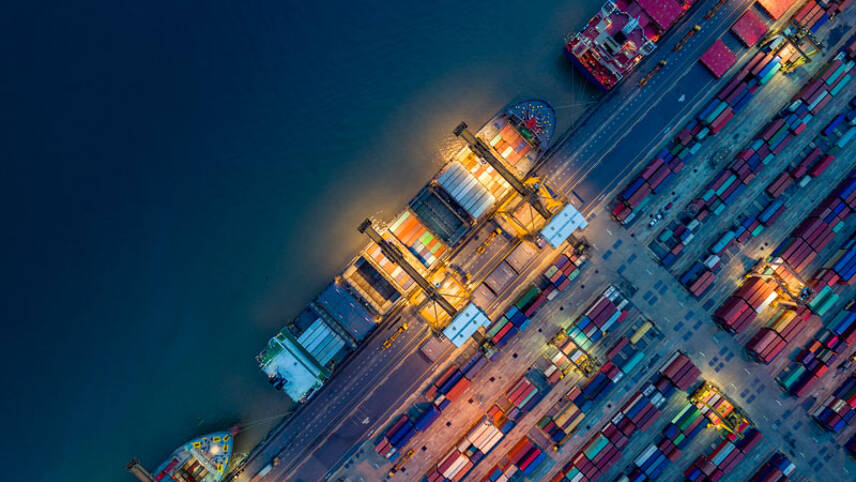Register for free and continue reading
Join our growing army of changemakers and get unlimited access to our premium content

Take anything we use in daily life – the technology we rely on, food we eat, the clothes we wear – and it will have a complex supply chain sitting behind it. Supply chains are networks of relationships between organisations, their suppliers and all the actors and players – individuals, contractors, distributors, logistics providers, technology partners – in between. They are webs of contracts and agreements that are necessary to source, manufacture, and deliver goods and services worldwide.
The global and intricate nature of supply chains impacts everything around them, from the environment to the people involved every step of the way. According to the latest ILO estimates, more than 50 million people globally are living in conditions of modern slavery, including in global supply chains. Supply chain operations also account for over 90% of an organisation’s greenhouse gas emissions. UN Global Compact participants rank supply chain practices as the biggest challenge to improving their sustainability performance.
All this means there’s a huge opportunity for those managing supply chains to accelerate progress on sustainability goals by focusing on human rights, labour practices, and environmental impacts.
The last 12 months alone have seen increased pressure on global supply chains to address sustainability impacts. The convergence of geopolitical tensions, economic uncertainty, extreme weather events and technology-powered digital disruption, along with increasing regulatory requirements such as the EU’s Corporate Sustainability Reporting Directive (CSRD) and Corporate Sustainability Due Diligence Directive (CSDDD), is directing organisations to focus on reducing environmental impact and improving social responsibility within their supply chains.
There are several factors organisations of all shapes and sizes can consider to prioritise supply chain sustainability in the year ahead:
- Evolving regulation and transparency
Proactively build a clear understanding of sustainability-related regulations relevant to your organisation depending on location, operations and geographic or sector-specific risks. As identified in the 2024 Supply chain risks and opportunities report, the next few years are expected to see an increase in sustainability reporting requirements, especially in the EU, including accounting for social and environmental due diligence. Organisations can get ahead by understanding the scope of these requirements and the data they will need to collect. Further to this, with Deloitte reporting that 29% of UK consumers would stop purchasing brands or products with ethical and sustainability-related concerns and over a third of people polled by SurveyMonkey saying they would buy a product that’s better for the environment over a cheaper alternative, it is evident that transparency in the steps taken by organisations wanting to improve the sustainability and ethics of their supply chain is important for commercial success. - Data
Identify where sustainability data is held within your organisation and use it to underpin decision making to mitigate risk and progress toward a more sustainable supply chain. As set out in BSI’s report, the ability to transform raw data into actionable insights has the potential to help organisations answer today’s increasingly difficult questions and, in turn, drive cost and time efficiency. - Engagement
With a greater focus on regulation or reporting requirements, those managing supply chains are facing greater expectation around transparency and knowledge of their wider supply chain. Organisations can get ahead by mapping, prioritising, and determine the correct level of engagements with their entire supply chain, ensuring that their business partners are meeting expectations. - Collaboration
Change cannot be brought about in isolation. Collaboration is required internally across your organisation and externally through the supply chain. The report finds that collaboration can empower organisations seeking to open the opportunity presented by today’s supply chain challenges and that trust is the key to successful collaborative relationships. - Ethical Supply Chains
People make supply chains function. It is important to establish controls to protect the people at the heart of the supply chains, including those that not directly employed (such as migrant workers or subcontractors) by ensuring that you are managing supplier relationships and engaging suppliers on key human rights requirements. Mapping areas of highest human rights risks, and targeting suppliers operating in these environments, can help address these issues.
Think again about that technology, food or clothing that you use in your day-to-day life. How comfortable would you be if you knew it arrived at your door having had a negative impact on the environment or the people involved at different stages of the supply chain? Ultimately, embedding sustainability in supply chains can bring enormous benefits to people and the planet, and help to accelerate progress to a fair society and a sustainable world.
Now available on-demand: edie’s free webinar on supply chain sustainability
Readers can now access an on-demand recording of edie and BSI’s recent webinar on sustainable and resilient supply chains.
Originally broadcast live on Thursday 15 February, this one-hour case study webinar was developed to help organisations of all sizes and sectors to improve management approaches across the supply chain, embedding sustainable practices and building resilience.



To Kimberly Rodriguez
Congratulations for your article.
I would like to write to your e-mail so that you know the situation in the Spanish foodservice concerning supply chain
Regards
Fundacion Restaurantes Sostenibles